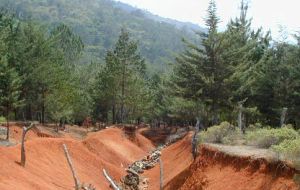MercoPress. South Atlantic News Agency
Agriculture methods accelerate erosion and global warming, says UN report
 Unsustainable agricultural and forestry practices deplete carbon in the form of organic matter
Unsustainable agricultural and forestry practices deplete carbon in the form of organic matter Global warming will get worse as agricultural methods accelerate the rate of soil erosion, which depletes the amount of carbon the soil is able to store, a United Nations' Environment Programme report said on Monday.
Soil contains huge quantities of carbon in the form of organic matter which provides nutrients for plant growth and improves soil fertility and water movement. The top metre of soil alone stores around 2,200 billion tons of carbon, which is three times the level currently held in the atmosphere, said the UNEP Year Book 2012.
“Soil carbon is easily lost but difficult to rebuild,” the report said.
”Soil carbon stocks are highly vulnerable to human activities. They decrease significantly (and often rapidly) in response to changes in land cover and land use such as deforestation, urban development and increased tillage, and as a result of unsustainable agricultural and forestry practices.“
Such activities can break down soil's organic matter. When this happens, some carbon is converted to carbon dioxide, a greenhouse gas that is one of the main contributors to global warming, and it is lost from the soil.
Around 24% of global land has already suffered from declines in health and productivity over the past quarter of a century due to unsustainable land use, UNEP said. Some 60% of carbon stored in soils and vegetation was lost as a result of land use changes, such as clearing land for agriculture and cities, since the 19th century.
As global demand for food, water and energy is forecast to rise dramatically, soils will come under increasing pressure.
Without changing the way land is managed, over 20% of forests, peat-lands and grasslands in developing countries alone could lose vital ecosystem services and biodiversity by 2030, the report said.
The degradation of peat-lands is a particular concern.
Peat-lands contain over a third of the world's soil carbon, making them the most effective carbon store on earth. But the draining of peat-lands currently produces over 2 billion tons of CO2 emissions a year - equivalent to around 6% of manmade greenhouse gas emissions, the report said.
To ensure soil carbon stocks are enhanced, not depleted, UNEP suggested agricultural methods such as reduced tillage and the careful use of animal manure or chemical fertilisers and crop rotation.
Financial incentives to improve land use such as payments for carbon storage, flood control and water quality improvement, and a global climate deal that includes the trade of carbon credits for soils could help improve management of soil resources, the report said.
Although rules governing the treatment of land use, land use change and forestry are being debated as part of a new global climate deal, UNEP said there was a ”critical need” to develop universal ways to measure, report and verify changes in soil carbon over time”.




Top Comments
Disclaimer & comment rules-

-

Read all commentsUNEP Year Book 2012 = Green fascism Agenda to take over your sovereirgnty, pay more taxes for less (sounds familiar? ever heard of austerity measures?) and no rights to own property etc. etc.
Feb 14th, 2012 - 03:20 am 0But carbon stocks remains the same.......
Feb 15th, 2012 - 09:11 am 0Commenting for this story is now closed.
If you have a Facebook account, become a fan and comment on our Facebook Page!